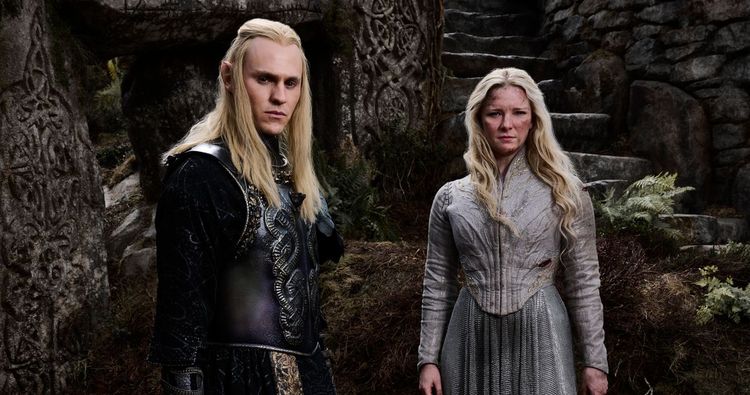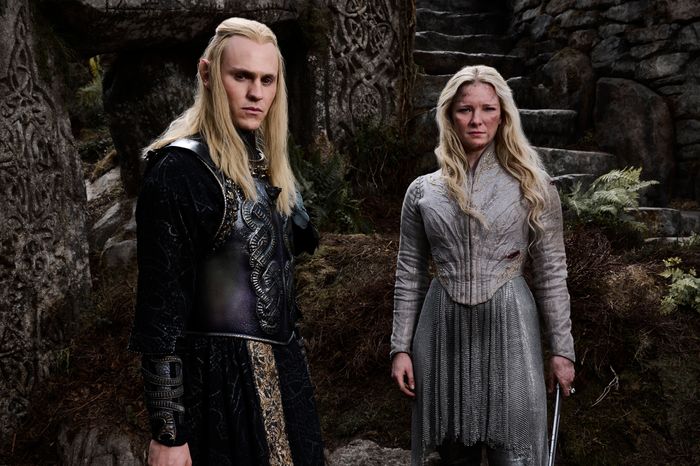‘Rings of Power’ Season 2 Should Be Having More Fun

Let's Have More Fun In Middle Earth!
Written by Jackson McHenry, a Vulture writer specializing in theater, movies, and television.

Picture: Ben Rothstein/Prime Video In the photo above, we can see a stunning image captured by Ben Rothstein for Prime Video.
After investing hundreds of millions of dollars in The Rings of Power, Amazon has yet to surprise viewers with any unexpected scenes. The mysterious Halbrand character turned out to be Sauron, and the unknown settlements in the Southlands became Mordor. The identity of the "Stranger" remains a mystery, but it seems likely that he will transform into a familiar wizard from Tolkien's stories in season two.
The Rings of Power series is strongly influenced by the idea of fate. This is a deliberate aspect of the show created by Patrick McKay and J.D. Payne, who adapted it from The Lord of the Rings appendices. The story follows the emergence of the evil Sauron and the final alliance between elves and men at the conclusion of the Second Age in Middle Earth. Even if you are not familiar with all the specific names mentioned, you can still see that there are certain obligatory elements that must be included: introducing Sauron, showing how he tricked the elves, depicting the creation of the Rings of Power, and setting the stage for the current situations of the elves and men. (And, of course, because no Lord of the Rings story is complete without beloved hobbit characters, we also catch a glimpse of the Harfoots before they became hobbits.)
McKay and Payne are deeply involved in all of Tolkein's stories, and it can be quite enjoyable to watch them figure out how to connect the big picture of the series. They have cleverly linked the universe's valuable metal Mithril, the history of the jewels called the Silmarils, and the greed that led to the dwarves' downfall. However, despite the show's apparent plotline, McKay and Payne often play games with their main characters to delay the story. The first season started strong but quickly lost momentum. For example, the twist involving Charlie Vickers's character Halbrand being Sauron was dragged out for too long. In the second season, Sauron returns in the disguise of the elven Annatar with a less than convincing wig. Vickers's performance is captivating, but the plot relies on unrealistic circumstances to keep his true identity a secret from knowledgeable elves.
From a distance, The Rings of Power seems like an exciting adventure story. However, when you focus on individual scenes, the show can feel careful and scripted. There are hardly any funny characters, although the dwarves occasionally bring some humor. The dialogue can be a bit too flowery and heavy, which matches Tolkien's writing style but might make the show feel a bit dull. Unlike Peter Jackson's movies, which managed to blend humor and seriousness seamlessly, this show struggles to find the right balance. The best moments in the films used small, quirky moments to enhance the grandeur of the story, but Rings of Power lacks the same attention to detail in its characters. Without well-developed characters, important speeches or moments can feel hollow and uninspired.
The Rings of Power is often focused on big, cinematic shots that can sometimes be overwhelming. There are moments that will appeal to fans, like the impressive tree of the Elves glowing brightly, but the music can sometimes be too intense. The show tries to balance its serious tone with some light humor, but it doesn't always work. Compared to HBO's House of the Dragon, The Rings of Power falls short in creating surprising characters within a known story. House of the Dragon manages to bring new depth to its characters within the established history. While The Rings of Power shouldn't abandon its seriousness, there are valuable storytelling lessons to be learned from the way other fantasy series like Game of Thrones trusted their actors with character-driven scenes. Morfydd Clark and Robert Aramayo have a compelling dynamic as Galadriel and Sauron, but they're not given as many opportunities to showcase their chemistry compared to other fantasy shows. The series could benefit from more character interactions and moments that enrich the world-building without sacrificing its high-mindedness.
Instead, much of the dialogue in Rings of Power serves a practical purpose. In Tolkien's writings, there is an abundance of symbolism and traditions, with songs sung around campfires and stories passed down through references to other great tales. He created this fictional world out of his passion for languages. The simplistic exchanges in Rings of Power, such as "Mithril production up 30 percent, let’s hope we don’t make the mountain mad," "hahaha of course I’m not Sauron, look at my beautiful blond hair," and "oh boy I hope nobody tampered with my secret ring-making process," do not fully capture the depth of self-identity these characters find in Middle Earth's ancient myths and legends.
Even though I'm being critical of The Rings of Power, the second season does get better as it goes on. Amazon probably doesn't want me to give away too much, but all the storylines come together for a big showdown where characters who were on their own finally meet. The show puts a lot of money into impressive battles and a cool fight between Galadriel and Sauron. But it can't seem to quit long speeches and obvious character revelations (one moment made me cringe). The problem with these moments, besides being boring, is that they take up time in a show that has a whole world to explore. Middle Earth is full of weird and legendary things: I have so many questions about daily life in Númenor that don't get answered because of a simple plot twist.
The Rings of Power is responsible and well-known, but it lacks depth and creativity. Its tragedy mirrors the downfall of one of its main characters, the Elf craftsman Celebrimbor. In the series, Celebrimbor is creating the Rings of Power using Mithril in order to achieve a brightness similar to the Silmarils, which themselves hold a portion of the light from the Elven homeland of Valinor. This creates a sense of repetition and imitation, resulting in a lack of originality and a doomed endeavor from the beginning.





















































